Pinkerton: Boots on the Ground in a Middle East Hot Zone — What Could Go Wrong?
 Sameh Rahmi/NurPhoto, Omar Qattaa, GPO/Handout/, Mostafa Alkharouf/Anadolu/Getty Images, Zouki, Foley/AP
Sameh Rahmi/NurPhoto, Omar Qattaa, GPO/Handout/, Mostafa Alkharouf/Anadolu/Getty Images, Zouki, Foley/AP
This author recalled in 2021, here at Breitbart News, the 1983 suicide truck bombing of the Marine barracks in Beirut, Lebanon, that left 241 American servicemen dead. That disaster brought a quick end to the U.S. mission in Lebanon, which was “peacekeeping” in a war zone. If that doesn’t sound like such a good idea, that’s because it wasn’t. In the wake of the disaster, I wrote, “Uncle Sam had learned a lesson about the dangers of misbegotten missions in the Middle East—at least for a little while.”
It was, indeed, a lesson learned for “a little while”—and only for a little while. Because, as we all remember, in the early 2000s, the U.S. launched new misbegotten missions in the region, first in Afghanistan, and then in Iraq. (The Afghanistan mission was justifiable at the outset; however, it stretched out for too long, into misbegottenness. As for Iraq, that was most definitely misbegotten from the outset—and never got better.)
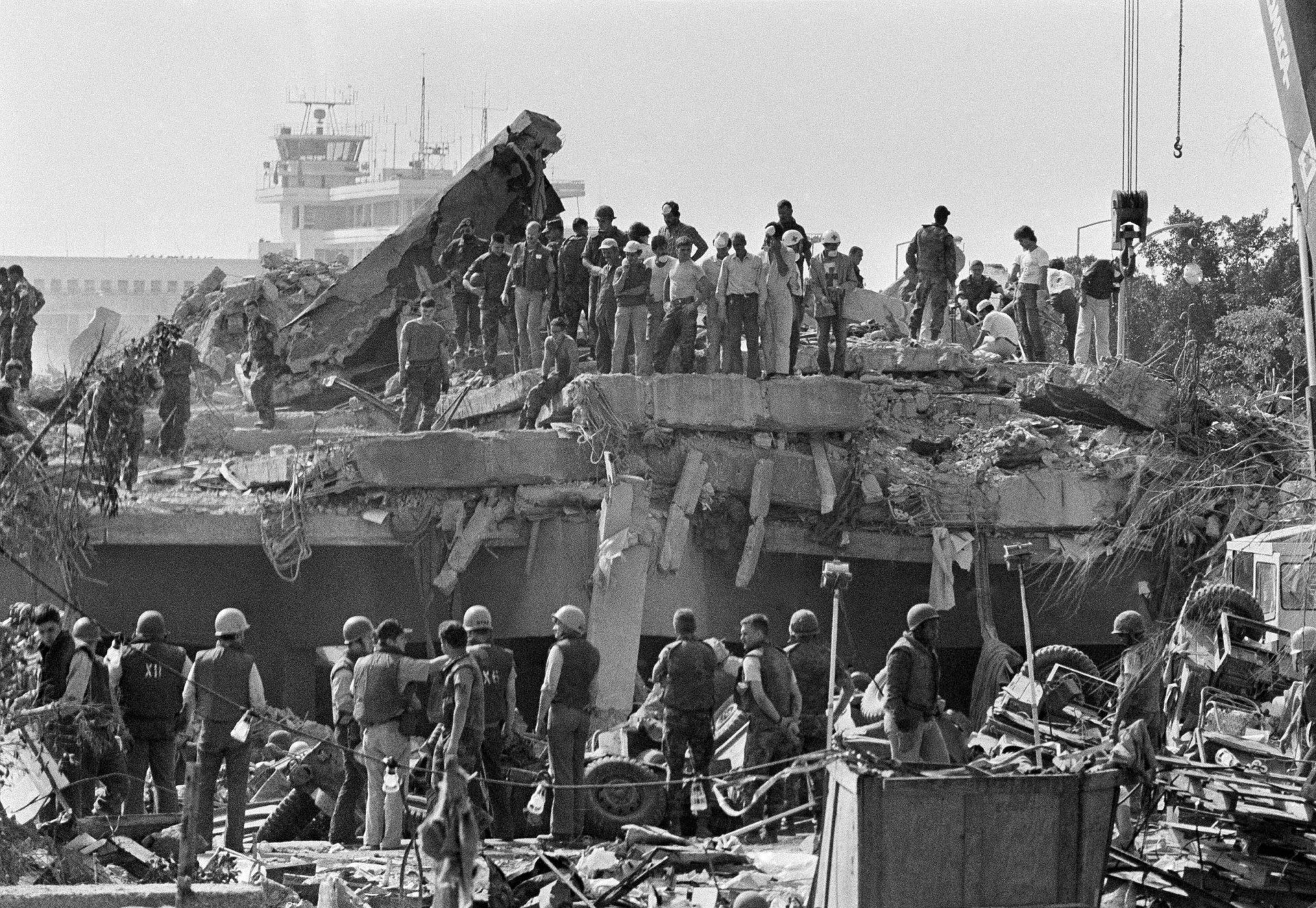
Rescuers probe the wreckage of the U.S. Marine barracks in Beirut, Lebanon, on October 24, 1983, a day after a suicide truck bomb destroyed the barracks. (AP Photo/Zouki)
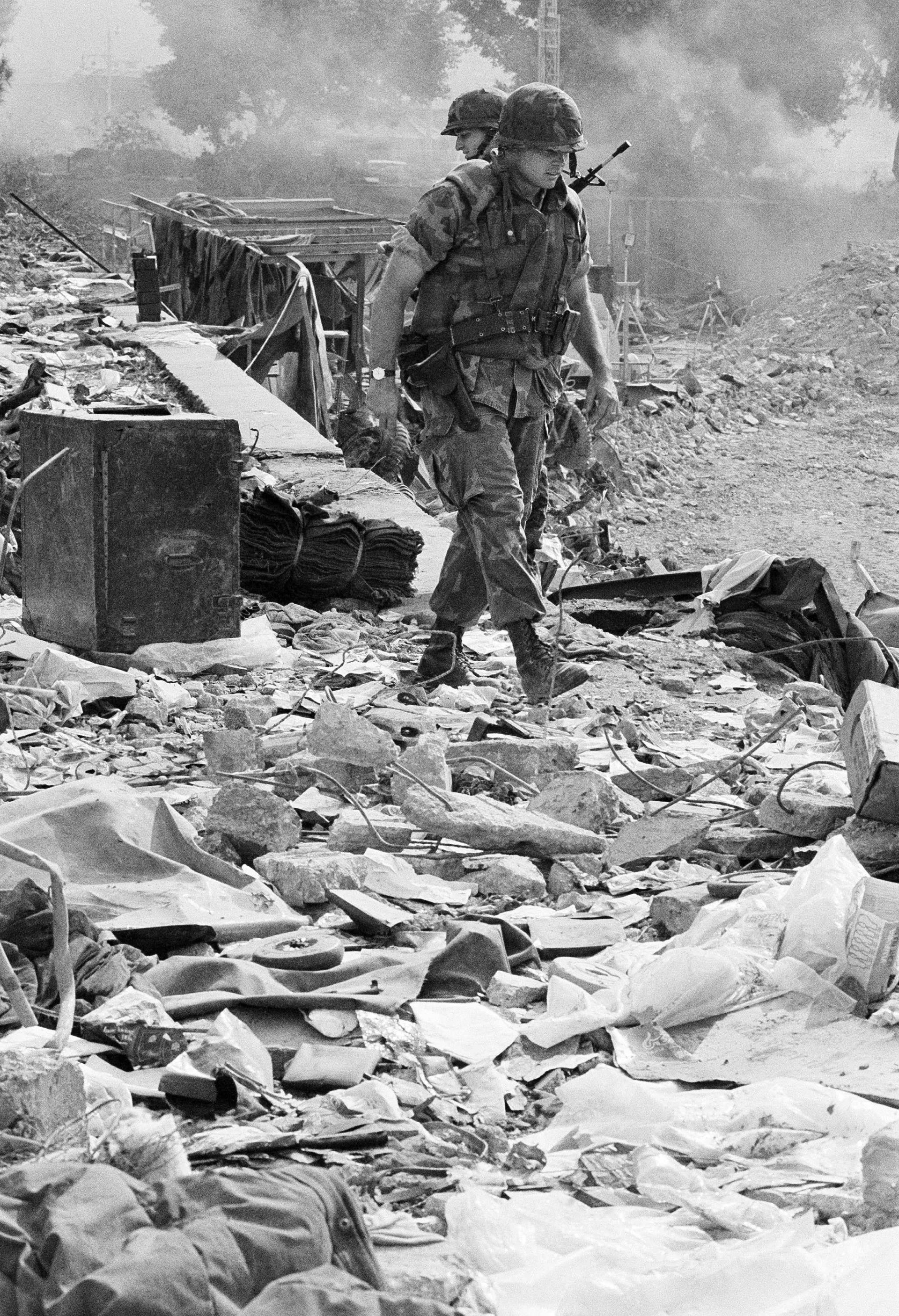
An American peacekeeper searches the debris of the U.S. Marine barracks in Beirut on October 27, 1983, looking for bodies and personal belongings of the victims of the truck bomb that destroyed the U.S. command center in Lebanon. (AP Photo/Foley)
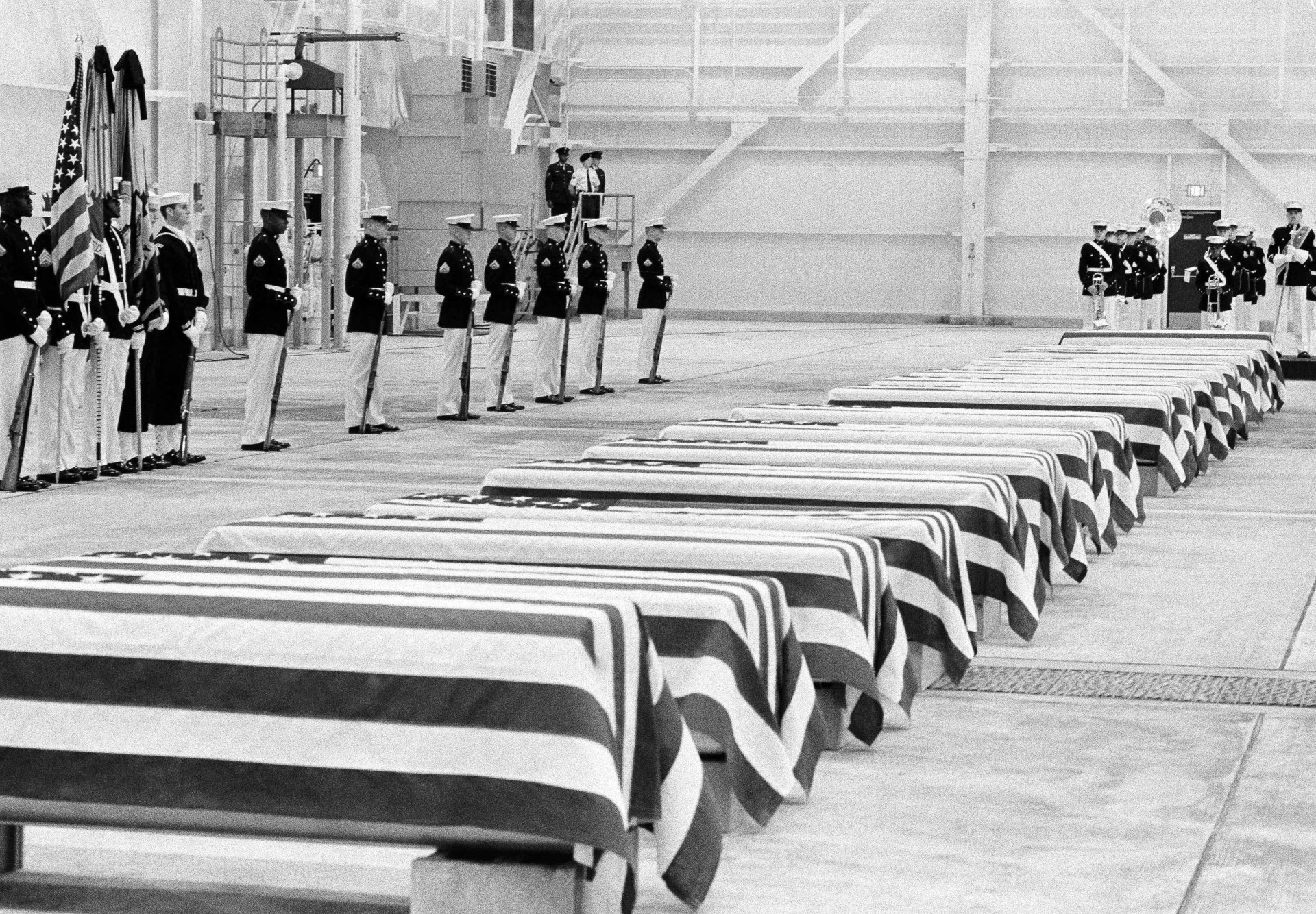
A Marine honor guard and band are shown with 16 coffins of U.S. Marines killed in the Beirut bombing, during a service at Dover Air Force Base on October 29, 1983. (AP Photo)
So now, President Joe Biden has announced a new mission for the U.S. military in the Middle East—and this one, too, has “misbegotten” written all over it. In his March 7 State of the Union address, Biden said that Uncle Sam would build a pier to help deliver relief aid to Gaza.

President Joe Biden during a State of the Union address at the U.S. Capitol in Washington, DC, on March 7, 2024. (Shawn Thew/EPA/Bloomberg via Getty Images)
The most obvious concern about this pier is that it’s going to be another Beirut barracks-type situation; that is, American service personnel working to build the pier and managing supply logistics while Hamas, Iranian agents, and who-knows-who-else are looking on with suspicion and quite possibly taking aim with rifles, rockets, and drones.

A member of Ezzedine al-Qassam Brigades, a military wing of the Palestinian Hamas movement, takes part in a parade in Gaza City on November 14, 2021. (MAHMUD HAMS / AFP) (Photo by MAHMUD HAMS/AFP via Getty Images)
Israel promises to provide a “security bubble” for the pier project, which is nice, but the Israel Defense Forces (IDF) is still having trouble defending itself. In fact, after nearly six months of fighting, Hamas is still a force. According to a March 27 report in the Washington Post, “The IDF says it has ‘dismantled’ 20 of the original 24 Hamas battalions. Dismantled does not mean destroyed; its remnants are still capable of waging a lethal insurgency, evidenced by this week’s heavy fighting in the north.”
So the U.S. is going to build a pier in the middle of this?

An Israeli army battle tank at a position along the border with the Palestinian territory on March 19, 2024, during the ongoing conflict between Israel and the militant group Hamas. (JACK GUEZ/AFP via Getty Images)
Biden has tried to address the obvious concerns, pledging, “No U.S. boots will be on the ground.” But is that really true? Is it really possible to manage a huge construction project without putting Americans in harm’s way?
Perhaps it is possible, through a circuitous process. A March 19 report from Israel said that the U.S. was planning to hire Al-Hisi, a construction firm based in Qatar. Qatar, the tiny but oil-rich state in the Persian Gulf, is well known for its wily dealings; it operates, for instance, the Al Jazeera network—beaming news and propaganda worldwide—and it keeps diplomatic ties with the U.S. and Iran. And, oh, yes: Many of Gaza’s Hamas leaders actually live in Qatar. While the Al-Hisi company is not well known, the Israeli report describes it as “controlled and sponsored by Hamas.” Hmm.
In the meantime, it’s interesting that nearly a month after Biden’s announcement of the pier, nothing has yet been built in Gaza. By contrast, back in 1944, the U.S. quickly built portable harbors, code-named “Mulberries,” to support the amphibious landings on the beaches of Normandy. The first of these Mulberries was operating on June 18, D-Day + 12. If we could move that quickly 80 years ago, better technology would help us move much faster today. And crucially, for the speed of getting things done, there are no environmental impact statement requirements in Gaza.
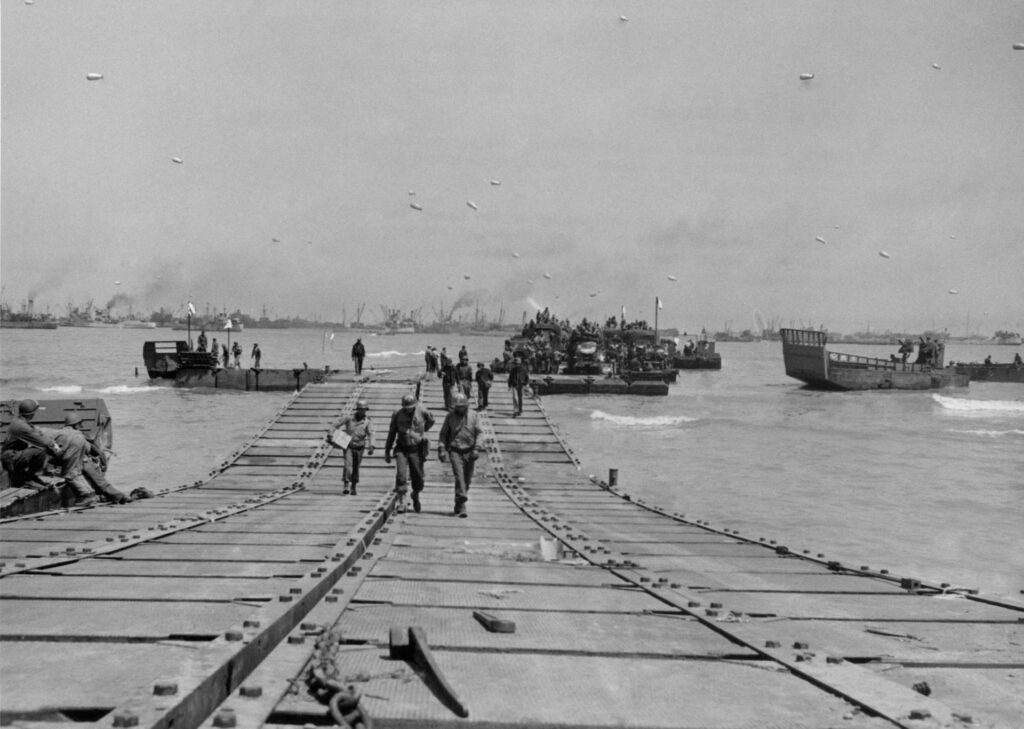
One of the causeways in the U.S. Mulberry in 1944, later drastically damaged by a tremendous storm in the English Channel. (AP Photo)
Yet it could be that the Biden administration is not, in fact, in a hurry to build the pier. After all, it’s dangerous to use Americans and dubious to use Qataris. So why, then, did the president announce it on March 7? What’s happened to fog things up since? Jokes about forgetfulness aside, it could be that the pier announcement was more of a statement than an actual plan.
In making such a statement, Biden could have been mindful of domestic politics more than international issues. You see, the politics of Gaza have changed a lot within the Democrat Party. Perhaps the matter is as simple as Biden’s determination to win Michigan’s 15 electoral votes—the Wolverine State being home to Rep. Rashida Tlaib, the firebrand Democrat from Detroit, and heavy with pro-Palestinian constituencies, more than just Arab-Americans.

Pro-Palestinian demonstrators march during a visit by President Joe Biden in Warren, Michigan, on February 1, 2024. (AP Photo/Paul Sancya)
For decades, Gaza has been reliant on ports in Israel and Egypt for its supplies. So having its own pier—paid for by the Americans no less!—could be an affirmation for Gaza, a symbol of its autonomy, even independence. (Strictly speaking, Hamas itself wishes to establish a region-wide Islamic theocracy, yet it’s practical-minded enough, in the short run, to see the value of having its own port, especially if it could accept cargo from Iran, as well as China and Russia.)
So the promise of building a pier for Gaza rates as outreach to the Democratic left, which looks forward to a Palestinian state, perhaps alongside Israel or perhaps, better yet, instead of Israel. For its part, the Biden Administration, having been vaguely in the middle, is now moving away from Israel. Some say, in fact, it's now actively hostile. Notably, Vice President Kamala Harris, eyeing her own future in the increasingly left-wing Democrat Party, has staked out a more progressive line on the Middle East.
Of course, independence for Gaza is not what Israel wants to hear; the Jewish State is convinced that it won’t be safe unless there’s some degree of Israeli and/or international supervision of Gaza. You know, “peacekeeping.”
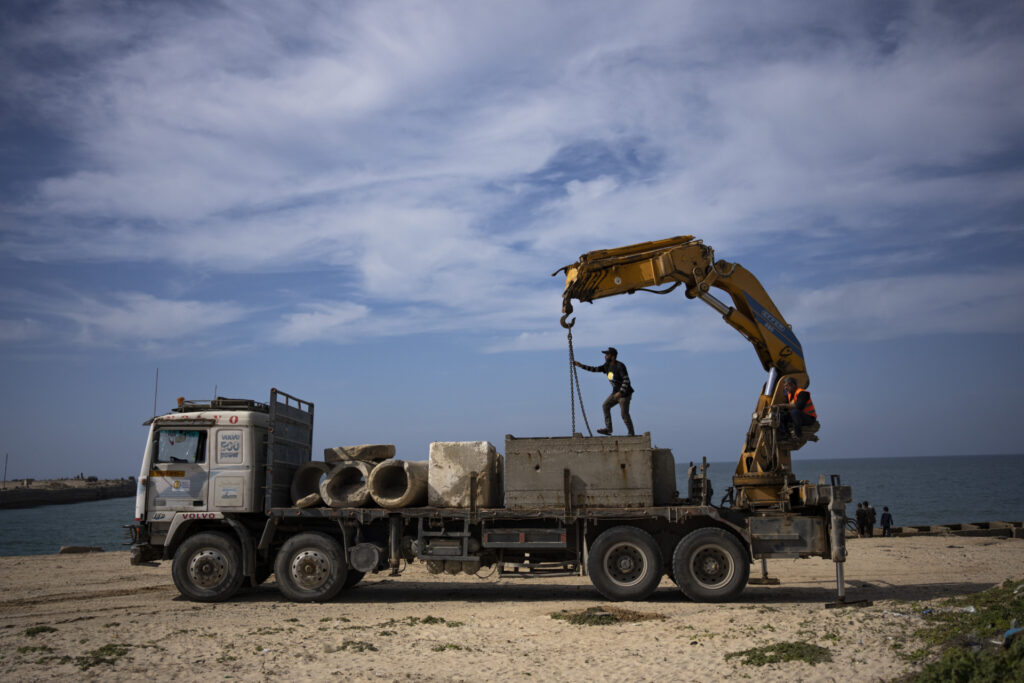
Palestinians bring cement blocks to a pier that could be used to bring humanitarian aid to the Gaza Strip in Khan Younis on March 13, 2024. (AP Photo/Fatima Shbair)
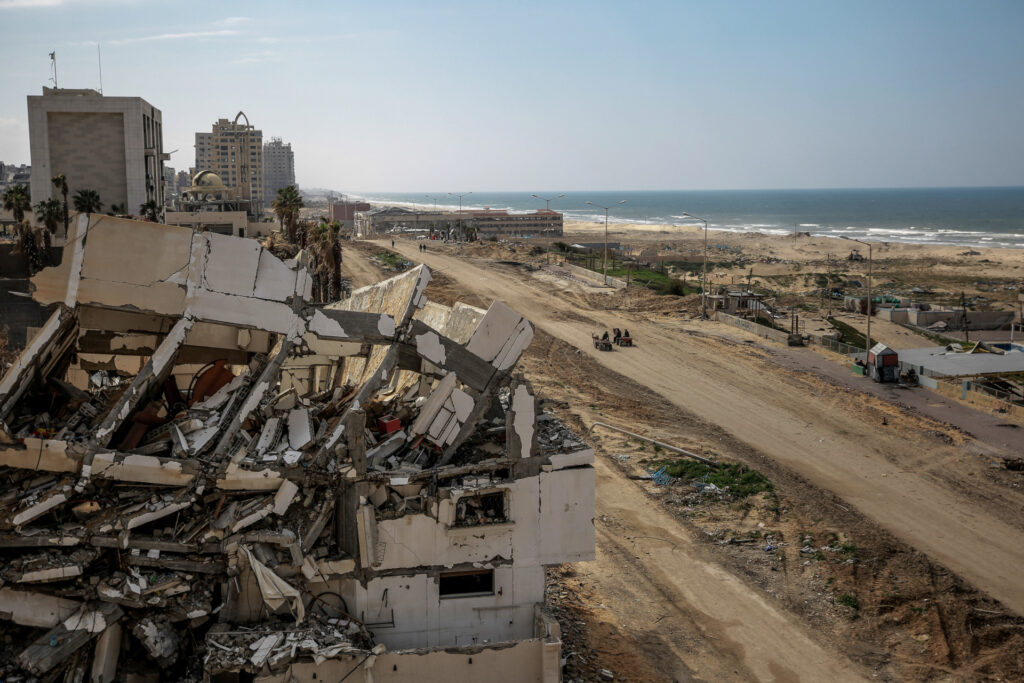
A view of the destruction at the coastal area of Rimal neighborhood after the withdrawal of the Israeli army in Gaza City, Gaza, on February 20, 2024. (Omar Qattaa/Anadolu via Getty Images)
Meanwhile, it’s worth pointing out that the American people as a whole strongly support Israel—a March 27 Harvard Harris poll put the figure at 79 percent.
So the Biden Administration is in a tricky spot. It wants to placate its own hard left: That means building the pier as a gesture to Gaza. But it also doesn’t wish to antagonize the pro-Israel American majority: That means not building the pier. And most of all, it wants to avoid some Beirut 1983-type disaster. Perhaps that issue can be finessed by using the Qatari contractor—and perhaps other Arab entities—but any of that will bring many questions from Congress and curious reporters—and God knows what danger down the road.
We can see that the Bidenites are stuck in a new kind of Middle East quagmire. So maybe the best thing to do, they are thinking, is to do nothing. Talk about the pier, sure, but don’t actually build it. With that goal in mind, maybe, yes, there’s some lengthy environmental impact statement that “needs” to be filled out, after all. Those things take time, you know, and can really slow down a construction project.
Source link

